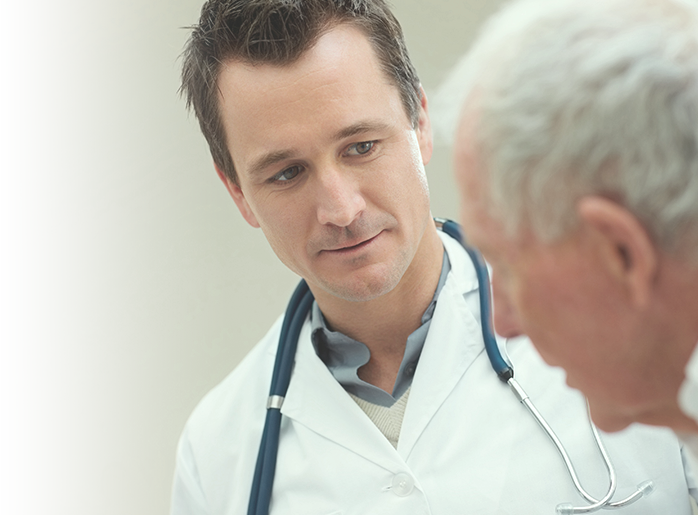Prostate Cancer
Know More: Prostate Cancer
Trustworthy information, straight from the source. Education is the first step in an empowering healthcare plan. Learn more about prostate cancer, from prevention to diagnosis and treatment.

Condition Overview
What is prostate cancer?
The prostate is the male sex gland that helps make semen. It is about the size of a walnut and wraps around the urethra. The urethra is the tube that carries urine from the bladder to the end of the penis. In most cases, prostate cancer is slow growing.
Risk Prevention
What increases my risk for prostate cancer?
- if you are 50 years or older.
- If you have a father or brother with prostate cancer.
- Regularly eating fried or high-fat foods.
- Eating few fruits and vegetables.
- Exposure to high amounts of certain chemicals, such as in cigarette smoke or alkaline batteries.
- A sexually transmitted infection (STI).
Diagnosis & Treatment Options
What are the signs and symptoms of prostate cancer?
You may have no symptoms during the early stages. In the later stages, you may have any of the following:
- Trouble starting or stopping the flow of urine.
- Feeling the need to urinate often, especially at night.
- Pain or a burning feeling when you urinate or ejaculate semen.
- Trouble having an erection.
- Blood in your urine or semen.
- Not being able to urinate at all.
- Pain or stiffness in your lower back, hips or upper thighs.
How is prostate cancer diagnosed?
- Digital rectal examination (DRE): This test checks the size and shape of your prostate. Your healthcare provider will insert a gloved finger into your rectum to feel if your prostate is large, firm or has lumps.
- Prostate-specific antigen (PSA): This blood test to checks PSA levels. These levels may be increased if you have prostate cancer.
- A biopsy: A biopsy takes a sample of your prostate gland to be tested for cancer. The sample may also help healthcare providers determine the stage of your cancer.
How is prostate cancer treated?
If you have early-stage cancer, your healthcare provider may recommend that you have frequent tests and regular follow-up visits to watch for changes. You may also need one or more of the following:
- Hormone therapy: A medicine used to decrease testosterone (male hormone) levels.
- Radiation therapy: This therapy kills cancer cells with high-energy X-ray beams. You may receive radiation therapy from outside your body or from small beads or rods placed inside your prostate.
- Surgery: Surgery may be needed depending on the stage of the cancer. Part or all of your prostate may be removed. You may also need to have some lymph nodes taken out. This may help keep the cancer from spreading to other parts of your body.
Preparing for Care
What can I do to manage my prostate cancer?
- Do not smoke. Nicotine can damage blood vessels and make it more difficult to manage your prostate cancer. Smoking also increases your risk for new or returning cancer and delays healing after treatment. Do not use e-cigarettes or smokeless tobacco in place of cigarettes or to help you quit. They still contain nicotine. Ask your healthcare provider for information if you currently smoke and need help quitting.
- Limit or do not drink alcohol. Limit alcohol to two drinks per day. A drink is 12 ounces of beer, one and a half ounces of liquor, or five ounces of wine.
- Eat a variety of healthy foods. Healthy foods include fruits, vegetables, whole-grain breads, low-fat dairy products, beans, lean meats and fish. Your healthcare provider may also recommend changes to the amounts of calcium and vitamin D you have each day.
- Manage your weight. Obesity may increase your risk for problems from prostate cancer. Limit or do not consume high-calorie foods or drinks.
- Exercise as directed. Exercise may help you recover after treatment and may help prevent your prostate cancer from returning. Exercise can also help you manage your weight. Try to get at least 30 minutes of exercise, five days a week, like walking.
- Ask about sexual activity. Ask your healthcare provider when it is safe for you to start having sex after your treatment. Medicines may be given if you have trouble getting or maintaining an erection.
- Manage incontinence. You may have incontinence (trouble controlling when you urinate) after treatment. Ask your healthcare provider for information on managing urinary incontinence. You may be able to gain control over your urination with techniques or medicines.
- Drink liquids as directed. Ask how much liquid to drink each day and which liquids are best for you. Drink extra liquids to prevent dehydration. You will also need to replace fluid if you are vomiting or have diarrhea from cancer treatments.
Call 911 for any of the following:
- Your leg feels warm, tender, and painful. It may look swollen and red.
- You suddenly feel lightheaded and short of breath.
- You have chest pain when you take a deep breath or cough.
- You cough up blood.
When should I contact my healthcare provider?
- You have a fever.
- You feel you cannot cope with your illness.
- You have blood in your urine or have trouble urinating.
- You have pain that does not get better after you take your medicine.
- You have questions or concerns about your condition or care.
